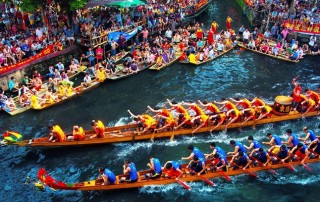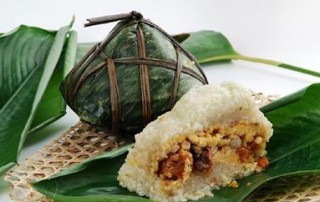Dragon Boat Festival or Duanwujie
 Dragon Boat Festival or Duanwujie is upon us! This traditional holiday that commemorates the famous Chinese Scholar Qu Yuan, known as China’s first poet, takes places on the fifth day of the fifth month of the traditional Chinese lunar calendar. This date is also the source of the alternative name used to refer to the Dragon Boat Festival, the Double Fifth Festival.
Dragon Boat Festival or Duanwujie is upon us! This traditional holiday that commemorates the famous Chinese Scholar Qu Yuan, known as China’s first poet, takes places on the fifth day of the fifth month of the traditional Chinese lunar calendar. This date is also the source of the alternative name used to refer to the Dragon Boat Festival, the Double Fifth Festival.
Like any other festival in China, the Dragon Boat Festival has its traditional foods and snacks, but the main happening of the day are the dragon boat races.
To mark the occasion, Lao Guo has written an article about this tradition, its history and how to celebrate it. Find the Chinese version at the bottom.
Dragon Boat Festival
 The Dragon Boat Festival, one of the 4 most important Chinese festivals (the other three festivals are Spring Festival, Qingming Festival, Mid-autumn Day), also known as Duanwu Festival, is a traditional and statutory holiday originating in China. The festival now takes place on the 5th day of the 5th month of the traditional lunar calendar (the 9th of June 2016), which is the source of its alternative name, the Double Fifth Festival. The focus of most celebrations involves eating zongzi (sticky rice treats wrapped in bamboo leaves), drinking realgar wine (雄黃酒, xiónghuángjiǔ), and racing dragon boats.
The Dragon Boat Festival, one of the 4 most important Chinese festivals (the other three festivals are Spring Festival, Qingming Festival, Mid-autumn Day), also known as Duanwu Festival, is a traditional and statutory holiday originating in China. The festival now takes place on the 5th day of the 5th month of the traditional lunar calendar (the 9th of June 2016), which is the source of its alternative name, the Double Fifth Festival. The focus of most celebrations involves eating zongzi (sticky rice treats wrapped in bamboo leaves), drinking realgar wine (雄黃酒, xiónghuángjiǔ), and racing dragon boats.
Qu served in high offices. However, when the king decided to ally with the increasingly powerful state of Qin, Qu was banished for opposing the alliance and even accused of treason. During his exile, Qu Yuan wrote a great deal of poetry. Twenty-eight years later, Qin captured Ying, the Chu capital. In despair, Qu Yuan committed suicide by drowning himself in the Miluo River.
It is said that the local people, who admired him, raced out in their boats to save him or at least to retrieve his body. This is said to have been the origin of dragon boat races. When his body could not be found, they dropped balls of sticky rice into the river so that the fish would eat them instead of Qu Yuan’s body. This is said to be the origin of zongzi.
Interested in reading more about Chinese culture? See our post on one of the biggest holidays in China, The National Day of China. For more information read our post on the origins of the Chinese zodiac signs, or read about how to celebrate Chinese Lantern Festival.
端午节
(中国传统节日)
端午节,为每年农历五月初五。今年的端午节是六月9日-11日。
自古以来端午节便有划龙舟及食粽等节日活动。端午节与春节、清明节、中秋节并称为中国汉族的四大传统节日。 自2008年起,端午节被列为国家法定节假日。2006年5月,国务院将其列入首批国家级非物质文化遗产名录;2009年9月,联合国教科文组织正式审议并批准中国端午节列入 世界非物质文化遗产,成为中国首个入选世界非遗的节日。
端午节是“祛病防疫”的节日。古人在门上悬挂菖蒲、艾叶等,故端午节也称“菖蒲节”。
据《史记记载,屈原,战国末期楚国丹阳人,是春秋时期楚怀王的大臣。公元前278年,秦军攻破楚国京都,屈原眼看自己的祖国被侵略,心如刀割,但是始终不忍舍弃自己的祖国,于五月五日,在写下了绝笔作《 怀沙》之后,抱石投汨罗江自尽,以自己的生命谱写了一曲壮丽的爱国主义乐章。
相传,屈原投江后,当地百姓闻讯马上划船捞救,一直行至洞庭湖,始终不见屈原的尸体。那时,恰逢雨天,湖面上的小舟一起汇集在岸边的亭子旁。当人们得知是为了打捞贤臣屈大夫时,再次冒雨出动,争相划进茫茫的洞庭湖。为了寄托哀思,人们荡舟江河之上,此后才逐渐发展成为龙舟竞赛。百姓们又怕江河里的鱼吃掉他的身体,就纷纷回家拿来米团投入江中,以免鱼虾糟蹋屈原的尸体,后来就成了吃粽子的习俗。
端午节的由来说法甚多,各地过法虽不尽相同,但包粽子、划龙船是普遍习俗。
推荐一个古代保健方法:干洗脸
在有空的时候,双手互相用力搓数下,感觉热了,然后摩擦面部,俗称:干洗脸。
作用:预防感冒,提神醒脑,提高思维,有益视力。
郭斗